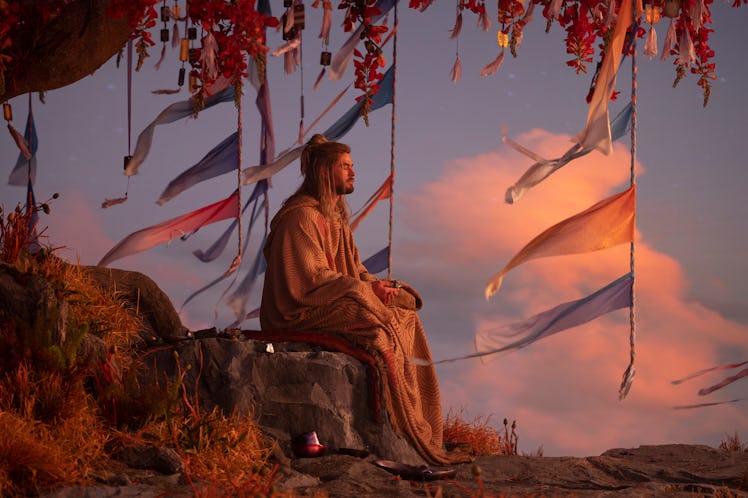Thor: Love & Thunder’s Twist Ending Was Actually Spoiled By Its Title
Marvel did something it’s never done before. But what’s next?

It’s not clear if Thor: Love & Thunder is Chris Hemsworth’s final outing as Thor. But the end of the film — now out in theaters — certainly leaves the God of Thunder in a new and different place than Marvel fans have ever seen him.
It could be a fitting conclusion to his tale or a jumping-off point for new adventures. Whether it’s an ending or merely a pause, the finale of Love & Thunder was unexpected, but in retrospect, it was obvious. It was right there in the name! Warning: This story fully spoils Thor: Love & Thunder
In Fatherly’s review of Love & Thunder, we called it the MCU’s “dad rock” movie, though spoilers prevented us from getting too explicit about why it earns that title. Having seen the movie, the answer is clear: It’s because the film ends with Thor becoming a dad, as he adopts the resurrected, empowered, and orphaned daughter of Gorr the God Butcher. Together, Korg’s closing narration explains, they travel the galaxy doing good as the duo Love and Thunder.
Thor: Love & Thunder ending explained
Thor and Jane (a.k.a. The Mighty Thor) aren’t able to stop Gorr from reaching Eternity, the cosmic being who can grant his wish. As Jane lays dying from the cancer that’s eating away at her mortal form, Thor is able to convince Gorr, whose lifeforce is likewise being drained by the Necrosword not to use his wish to eliminate the gods but instead bring back his daughter. Gorr, who was motivated to go on his deity-slaying quest because of his daughter’s tragic death, agrees, asking his former enemy, Thor to look after her. Later, right before we cut to credits, we learn that Thor and the girl, who has cosmic powers as a result of her resurrection, are living the single dad domestic life and beating up bad guys together.
Natalie Portman as Jane Foster in Thor: Love & Thunder.
It’s a sweet and fun way to end the film, but it also subverts what many fans probably assumed the movie would be about going in. This is the movie that brought Thor’s love interest, Jane Foster, back to the MCU and gave her superpowers to match. Thor is aimless when the action kicks off, and he’s looking for meaning in his life. He’s looking for love, and since Jane, the love of his life, is back in the picture, audiences are primed to think what he’s seeking is romantic love.
In fact, the “love” in Love & Thunder is actually parental love, and Thor finds meaning in raising a child… even if she does draw faces on Mjölnir.
That’s not to say there aren’t other types of love in the movie. Valkyrie laments lost love, but she also gets a chance to do what she loves and find renewed passion in being the king of New Asgard. The romance between Jane and Thor is definitely a huge part of the movie, and even Korg has a romantic ending, as he finds a rocky partner at the end. But Love & Thunder is, sneakily, about parental love. It’s the villain’s motivation and the driving force of the hero's quest, as they’re on a mission to save the kidnapped children of New Asgard. The post-credit scene features Zeus looking to his son Hercules for support. The film is bookended with fatherly love. It starts with Gorr’s immense grief when his daughter dies in front of him while he’s powerless to do anything, and ends with Thor — a little haggard but, then again, what dad isn’t? — finding the meaning he was so desperately seeking in the raising of this little, ass-kicking girl.
Thor: Love & Thunder is hardly the deepest or most emotional Marvel movie. For a lot of its runtime, the Ragnarok follow-up is too focused on being funny to be truly heartfelt. That’s fine — there’s nothing wrong with a laugh at the movies. And yet, there’s something quietly wonderful about the fact that the film’s big twist is a reminder that love is more than just romance. Sometimes, it’s a father’s love for their child. Or, in this specific instance, a God of Thunder’s love for his resurrected adoptive daughter who has cosmic superpowers.
Thor: Love & Thunder is out in theaters now.